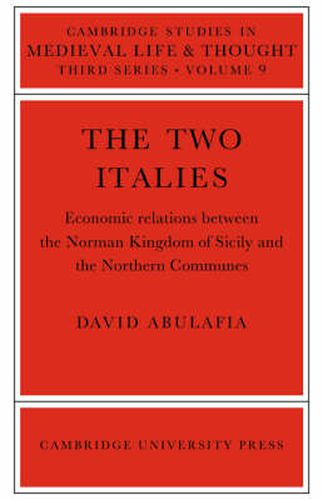Readings Newsletter
Become a Readings Member to make your shopping experience even easier.
Sign in or sign up for free!
You’re not far away from qualifying for FREE standard shipping within Australia
You’ve qualified for FREE standard shipping within Australia
The cart is loading…






This book is a study of the economic development of different areas of twelfth-century Italy whose commercial interests were closely inter related: the Norman Kingdom of Sicily, famed for the wealth of its rulers, and the maritime ports of Genoa, Pisa and Venice, which were actively extending their trading interests throughout the Mediterranean. On the basis of largely untapped sources in Genoa and other north Italian archives, this book seeks to explain how the north Italian merchants attempted to extend and to protect their interests in the kingdom of Sicily, by agreements with the Norman rulers or with those in Germany and Byzantium who aimed at the conquest of Sicily and southern Italy. Dr Abulafia argues that the kingdom was a major exporter of wheat and raw cotton, and that in the twelfth century the northern merchants gained a substantial hold over these exports. The Norman kings profited greatly from the opportunity to sell the produce of their realm, and in particular of their own estates, to an assured market; the lack of intensive industry in the kingdom left the northerners free to produce textiles out of southern fibres. Thus signs emerge of two Italies, an agrarian and pastoral south, against a north with incipient industrial activity, based partly on the commercial exploitation of the south.
$9.00 standard shipping within Australia
FREE standard shipping within Australia for orders over $100.00
Express & International shipping calculated at checkout
Stock availability can be subject to change without notice. We recommend calling the shop or contacting our online team to check availability of low stock items. Please see our Shopping Online page for more details.
This book is a study of the economic development of different areas of twelfth-century Italy whose commercial interests were closely inter related: the Norman Kingdom of Sicily, famed for the wealth of its rulers, and the maritime ports of Genoa, Pisa and Venice, which were actively extending their trading interests throughout the Mediterranean. On the basis of largely untapped sources in Genoa and other north Italian archives, this book seeks to explain how the north Italian merchants attempted to extend and to protect their interests in the kingdom of Sicily, by agreements with the Norman rulers or with those in Germany and Byzantium who aimed at the conquest of Sicily and southern Italy. Dr Abulafia argues that the kingdom was a major exporter of wheat and raw cotton, and that in the twelfth century the northern merchants gained a substantial hold over these exports. The Norman kings profited greatly from the opportunity to sell the produce of their realm, and in particular of their own estates, to an assured market; the lack of intensive industry in the kingdom left the northerners free to produce textiles out of southern fibres. Thus signs emerge of two Italies, an agrarian and pastoral south, against a north with incipient industrial activity, based partly on the commercial exploitation of the south.